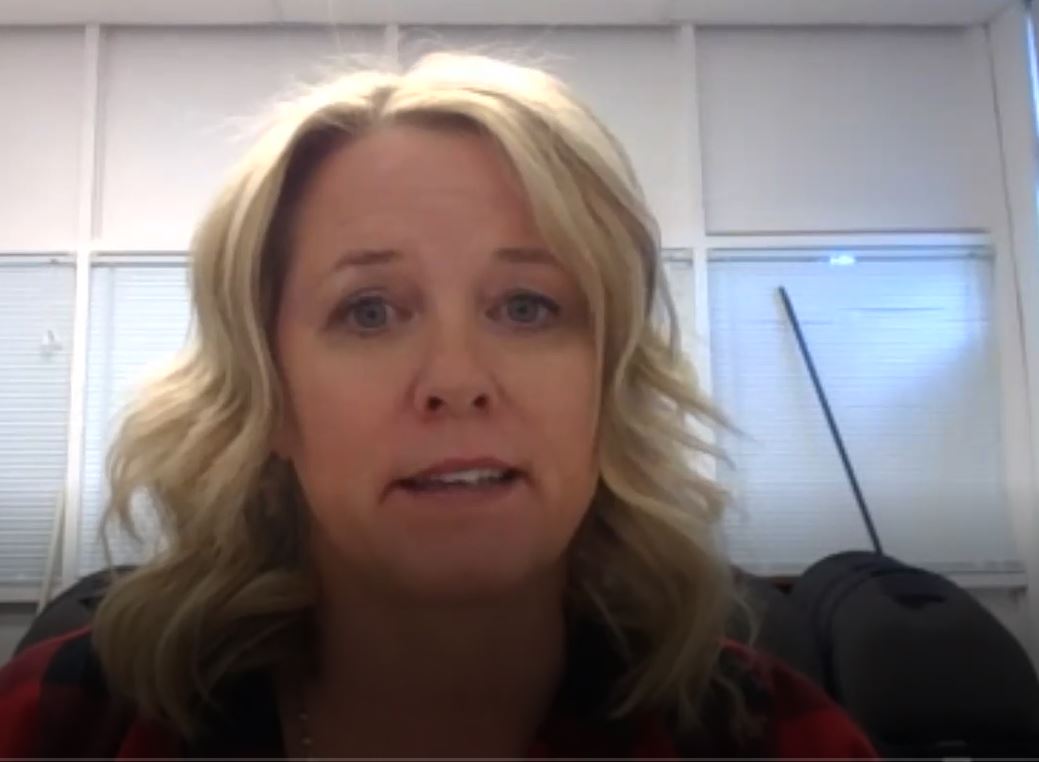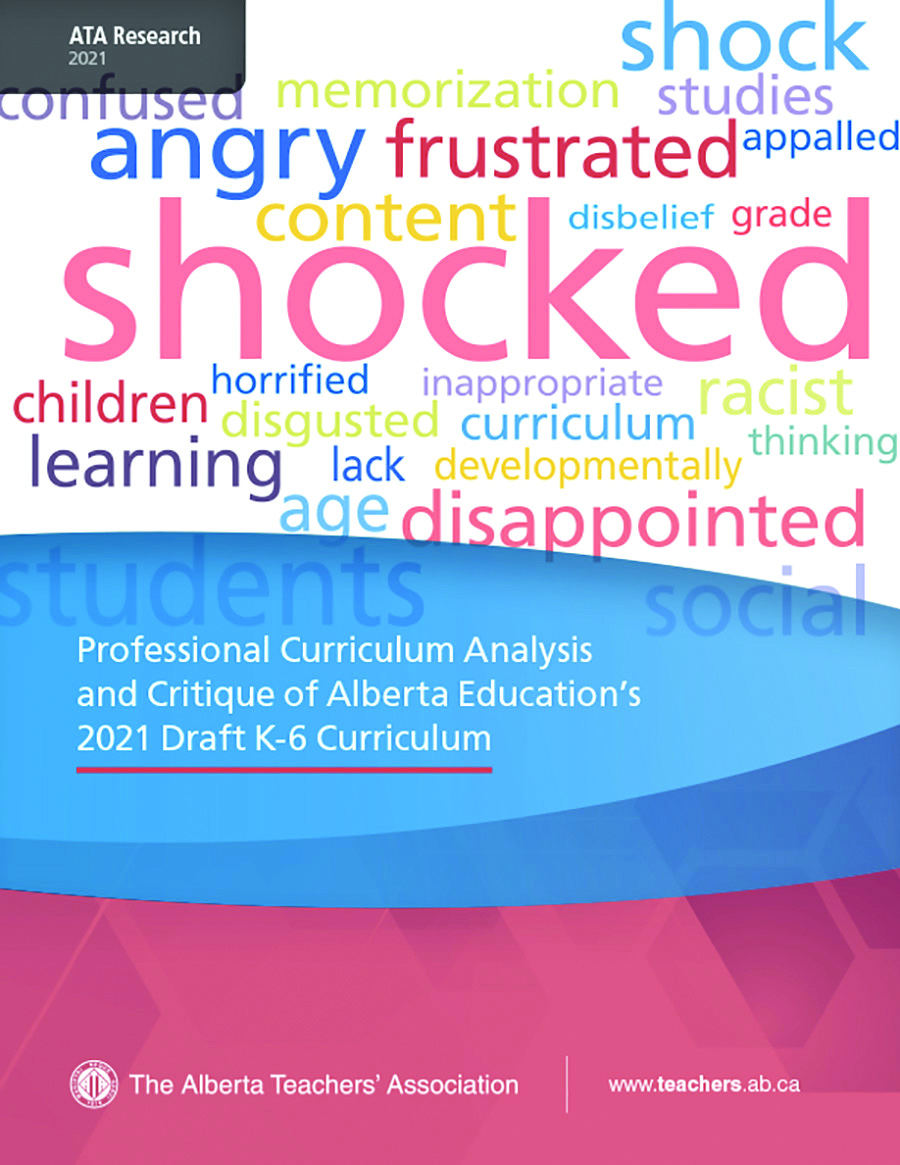Page Content
Working group participant speaks out after gag order expires
What Marliss Visser remembers most clearly from her time as part of the social studies curriculum working group was the feeling of pressure.

Teacher Marliss Visser speaks to attendees of a virtual curriculum panel hosted by the ATA on Nov. 26. Visser was one of several speakers who spoke of their experience participating in an Alberta Education curriculum working group last year.
The group, made up of 15 teachers, had two working days — a Thursday and Friday — to provide feedback to the Alberta government.
It was, Visser said, not nearly enough time.
“They kept saying ‘we have to keep moving, we have to keep moving,’” she recalls. “[I was thinking] how are we supposed to go through every single point and make changes and additions? It’s just too much.”
Compounding the frustration of that brief window of feedback was the non-disclosure agreement Visser and the other participants had to sign, which promised that they would remain silent on the contents of the draft curriculum until Oct. 31.
“It was so frustrating to have the non-disclosure agreement while we were listening to the news,” she said, noting that Education Minister Adriana LaGrange kept repeating that teachers were involved in the draft curriculum.
“Our names are being published, and oh my goodness, nobody’s going to know we actually fought really hard these last two days to the point where teachers were crying,” said Visser, who has 23 years of experience in both social studies and learning support.
Now that the non-disclosure agreement has expired, Visser is free to speak her mind on the draft K–6 social studies curriculum. She is one of six working group participants to sign an open letter to Albertans outlining their concerns with the curriculum and the process used to create it. Visser also shared her story during a curriculum panel session hosted by the ATA on Nov. 26. The event was attended by ATA local communications officers (LCOs) from around the province.
During her presentation, Visser didn’t mince words, saying that the draft is terrible.
“Some of the comments I heard [from other participants] were ‘I feel like I’m in the 1950s,’ and ‘we’re going backwards, not forwards.’ We really felt it wasn’t addressing anything that’s happening currently and it would not prepare our students moving forward. We were actually quite shocked.”
The working group had Thursday morning to review the draft on their own, and then they came together in the afternoon with a notetaker who was responsible for capturing their feedback. At each statement in the draft, working group participants would state if they agreed with the statement or not. It was so bad, Visser said, that some of the teachers were talking about walking out of the group altogether.
“[We thought] maybe it would be a better stance than trying to attack this and be held to a gag order. How are we going to get this communicated that this curriculum is awful?”
The group was supposed to finish its work on Friday afternoon, but many members continued working over the ensuing weekend to get their feedback in.
After all of their work, Visser says the new version of the draft isn’t much of an improvement.
“Maybe the things that weren’t true were taken out, but not a lot was changed,” she said.
Visser told the LCOs that she wanted them to know that the group was united in their attempts to express their negative opinions of the draft, and they worked hard to make improvements.
“It was a nightmare and I hope we represented you well.” ❚
DETAILED ANALYSIS
 Earlier this year, the Alberta Teachers’ Association engaged 6,500 teachers to analyze and critique the draft K–6 curriculum. The study concluded that the draft does not meet Alberta Education’s overall vision, guidelines and considerations for curriculum development. Among other concerns, the study found that the curriculum is not logically sequenced, is developmentally inappropriate and contains twice as many learning outcomes as the current curriculum while lacking in Indigenous and francophone perspectives.
Earlier this year, the Alberta Teachers’ Association engaged 6,500 teachers to analyze and critique the draft K–6 curriculum. The study concluded that the draft does not meet Alberta Education’s overall vision, guidelines and considerations for curriculum development. Among other concerns, the study found that the curriculum is not logically sequenced, is developmentally inappropriate and contains twice as many learning outcomes as the current curriculum while lacking in Indigenous and francophone perspectives.
Details are available at www.teachers.ab.ca > News and Info > Issues > K–6 Draft Curriculum
AN OPEN LETTER
Lacking authenticity
Dec. 7, 2021
Dear Albertans,
As members of the Government of Alberta’s curriculum working groups in December 2020, we are teachers who were selected to provide feedback on the draft K–6 curriculum that was publicly released in March 2021.
We were prohibited from speaking up before now due to nondisclosure agreements, and we honoured those agreements. However, due to questions about this draft curriculum and how it was developed and comments from the government that misled the public about how they have “consulted with teachers,” we feel a professional obligation to speak up.
From our perspective, as some of the few teachers who were provided an opportunity to give feedback on the draft curriculum before public release, the government’s consultations with teachers lacked authenticity and meaning. It was a performative, two-day meeting seemingly designed just to check the box for teacher consultation.
We took the responsibility of reviewing the curriculum seriously, and were prepared to offer constructive, useful feedback on the draft in the two days we had available to us. Unfortunately, the process made it difficult to do so.
There was too much content and too little time to thoroughly review it. Most of us did not have access to the materials until the day of the meeting, and technical issues prevented many from reading it until later in the day. Each group was assigned to review the K–6 draft outcomes for one of the six subject areas under review; the volume of material required us to review up to 100 pages in just a few hours. When we got into the drafts, some subject material contained a large number of mistakes or errors that needed to be addressed, which further inhibited our ability to meaningfully discuss the merits of the content.
Our ability to discuss this volume of material with any level of detail was very limited. However, because we know the importance to our students and colleagues of a quality curriculum, we persisted and set out to offer the best feedback we could. That feedback, however, was not adequate to address the concerns many of us identified with the drafts.
Most of us have been left with the impression that the government wasn’t really interested in constructive feedback. The experience was deflating and disappointing to the point that some of us requested that our names be removed from connection with this curriculum.
When we look at the drafts that were released publicly against the ones that we viewed in December, it is clear that much of the feedback was not appropriately considered. We are hard-pressed to identify any significant changes that were made as a result of the feedback we provided. Yet government officials regularly pointed to our work as validation for the draft, which was especially frustrating given that we continued to be under a nondisclosure order.
Although there are some positive changes in several subject areas, overall this curriculum is not up to the standards that students deserve and that teachers and Albertans expect. No curriculum will be usable by teachers or ready for students unless the teaching profession is appropriately and genuinely consulted.
We care about students and about developing a curriculum worthy of them. As professionals and colleagues, we are prepared to participate in such consultation, but it must be authentic, it must be comprehensive and it must be meaningful. This, unfortunately, was not.
Valerie Browne, science working group member
Gillian Dunn, social studies working group member
Alex Funk, English language arts working group member
Annie Greeno, social studies working group member
Deborah Hawkins, fine arts working group member
Cammie Kannekens, social studies working group member
Sam Livingstone, English language arts working group member
Marliss Visser, social studies working group member
A teacher from the fine arts working group
|
